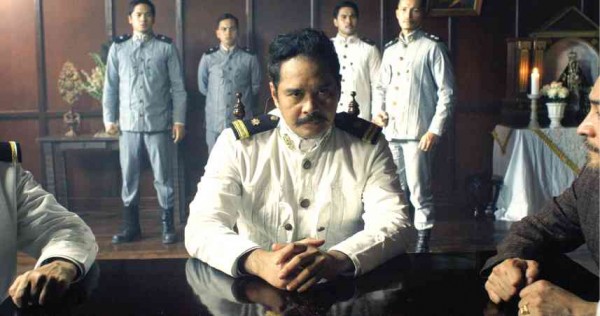
THE ACTOR describes “Heneral Luna” as “serious, witty, dramatic” and done “naturally,” not “stylized.”
JOHN Arcilla and I go a long way back. His late aunt Erly was one of my mom’s “Badiday Loyalists,” and he used to be the acting coach of my son IC Mendoza during his child-star days.
That’s why I am so happy that John has made it big in the biz. After being cast in foreign films, John portrays the lead role in “Heneral Luna,” which opens Sept. 9.
We gave the movie a grade of “A” at the Cinema Evaluation Board.
The biopic is based on the life of the fierce revolutionary Antonio Luna. Produced by Artikulo Uno Productions and directed by Jerrold Tarog, the movie resonates with every Filipino viewer because it evokes patriotism and rekindles a deeper appreciation for Philippine history.
Set against the backdrop of the Philippine-American War, the film is out to inspire a cultural awakening of sorts in younger generations.
John outdoes himself in the film. He makes it seem like Gen. Luna has been reincarnated.
How will our perception of Luna change after watching the movie?
Despite Gen. Luna’s commitment to free the Philippines from American colonization, he was misunderstood because of his decisions. People mistook his temper for arrogance or, worse, “dictatorial tendencies.” He was also human.
How did you prepare for the role?
I’m lucky that I can grow my mustache. I’m also lucky that since I started acting in theater in 1982, I have already essayed several hero roles that made me familiar with the era. This gave me an advantage… but I had to review my history, and revisited the biography of the general. I have to consider all the accounts about him.
How is your movie different from other local historical films?
It is a movie that was presented differently. We contemporized it. We were one in our intention of bringing it closer to today’s audience. It was delivered naturally rather than the stylized, “classical” way. It is serious, witty, dramatic. It’s for all kinds of audiences.
What did you learn from working with foreign productions?
They just have more budget to spend than us, but we are at par with ideas and artistry. Like them, we have a lot of stories to tell, and colorful experiences to share. Our people are trained well in the field of filmmaking.
One thing I envy about foreign productions is their system. They respect the time to rest—eight hours of work a day is enough. After that, it is already overtime and it is paid.
What’s more important, awards or box-office success?
They are both important to me. I think a sensible script and a beautifully crafted film should be seen by a lot of people. Quality films need more revenues because we need to produce more films of the same caliber. It is important that a film should have both critical and mass appeal.
If your life story were made into a movie, what would the title be?
“Life Is What You Make It.”